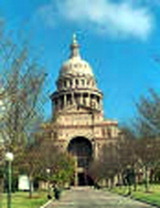Bill for bases may be 1st law
April 12, 2005
Gov. Rick Perry is expected to sign the first bill of the legislative session today, authorizing defense communities to use sales tax revenue for projects that support or redevelop military bases.
Written by Ty Meighan, Corpus Christi Caller- Times

AUSTIN - Gov. Rick Perry is expected to sign the first bill of the legislative session today, authorizing defense communities to use sales tax revenue for projects that support or redevelop military bases.
Senate Bill 252 by Sen. Craig Estes, R-Wichita Falls, allows communities to use voter-approved 4A/4B economic development sales taxes for the projects.
Both the House and Senate unanimously approved the measure, which takes effect when Perry signs it today.
Under the legislation, defense communities can dedicate sales tax revenues for projects that prevent the closure or realignment of an installation, to attract new missions or to redevelop the area if needed.
Before 2003, communities used the funds for military-related projects but mostly for redevelopment after bases were closed or realigned.
But Estes' bill was needed to correct a mistake from the 2003 legislative session, when lawmakers passed an economic development reform measure that unintentionally excluded military projects.
''It was an oversight last session and we need to go ahead and get some of this money spent if there's a military community that wants to spend it,'' said Estes, vice chairman of the Senate Committee on Veterans Affairs and Military Installations. ''We're happy to get that corrected and just glad the governor's going to sign it.''
Officials in Texas and other states are pressing hard to bolster their military facilities as the upcoming round of base closings looms. The Pentagon's list of recommended closures will be released next month.
Texas has 18 military installations and the Pentagon is looking to cut its infrastructure to save billions of dollars.
Perry believes the legislation is important to help defense communities, said Kathy Walt, a spokeswoman for the governor.
''It's one of the things that the governor mentioned in his State of the State speech in terms of helping military communities with their needs, particularly as we head into the BRAC process,'' Walt said.
Three senators who represent the Coastal Bend were co-authors of the legislation - Juan ''Chuy'' Hinojosa, D-McAllen; Eddie Lucio, D-Brownsville; and Judith Zaffirini, D-Laredo.
Rep. Gene Seaman, R-Corpus Christi, was a joint author of the identical House bill. And Reps. Juan Escobar, D-Kingsville, and Abel Herrero, D-Robstown were co-authors.
Although the legislation won't help Corpus Christi because the city has maximized its sales taxes, it could benefit Ingleside. One provision in the bill allows communities to use funds for a Coast Guard project if the facility is used jointly with a branch of the military, such as the Navy.
Ingleside city officials want to extend the pier for larger Coast Guard ships at the mine-hunter base to promote joint-training capabilities.
The Ingleside City Council determines the use of economic development sales tax revenue, said Roger Wright, president of the Ingleside Chamber of Commerce. But Wright said he supports expanding how the taxes can be used to promote economic development in the city.
''The chamber would very much like to partner with the city of Ingleside to increase the economic development efforts of our city, and we are currently exploring those possibilities," he said.
![]()
![]()
Related Stories
![]()
Fair Use Notice
This site contains copyrighted material the use of which has not always been specifically authorized by the copyright owner. We are making such material available in our efforts to advance understanding of environmental, political, human rights, economic, democracy, scientific, and social justice issues, etc. We believe this constitutes a "fair use" of any such copyrighted material as provided for in section 107 of the US Copyright Law. In accordance with Title 17 U.S.C. Section 107, the material on this site is distributed without profit to those who have expressed a prior interest in receiving the included information for research and educational purposes. For more information go to: http://www.law.cornell.edu/uscode/17/107.shtml. If you wish to use copyrighted material from this site for purposes of your own that go beyond "fair use", you must obtain permission from the copyright owner.